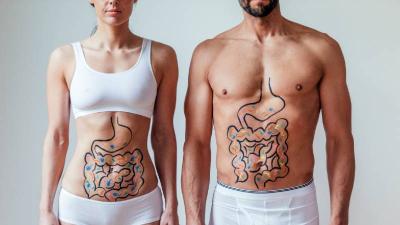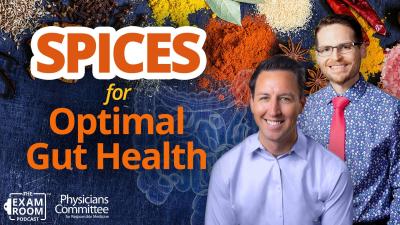The Physicians Committee Releases Seven Dietary Guidelines for a Healthy Microbiota
The Key to Optimal Gut Health? Eat 50 to 55 Grams of Daily Fiber

WASHINGTON—The nonprofit Physicians Committee releases seven dietary guidelines for a healthy microbiota, following the “No Guts, No Glory: the Microbiome in Diabetes” continuing medical education (CME) presentation by Meghan Jardine, M.S., M.B.A., R.D., L.D., C.D.E., on Friday, July 29, 2016, at the International Conference on Nutrition in Medicine (ICNM) in Washington, D.C.
The seven guidelines are as follows:
1. Build meals around plant-based foods: vegetables, fruits, whole grains, and legumes. This plant-based foundation supports symbiosis, or microbial harmony, in our gut. A thriving microbiota helps maximize absorption of nutrients and vitamins, while regulating immune function, inflammation, hormones, mood, and behavior.
2. Aim to consume at least 50 to 55 grams of fiber each day. Historic populations consumed nearly three to four times as much fiber as we do today. The average American today consumes 16 grams of fiber. Increasing dietary fiber intake by at least 14 grams a day is associated with a 10 percent decrease in net energy intake.
3. Consume at least 5 to 8 grams of plant-based prebiotics each day. This is easy to accomplish with two cups of leafy greens or a half-cup serving of beans. Good sources include Jerusalem artichokes, chicory root, raw dandelion greens, leeks, onions, garlic asparagus, whole wheat, beans, bananas, oats, and soybeans.
4. Add fermented foods, or probiotics, to your diet. Dietary sources include miso, tempeh, water kefir, and kombucha.
5. Avoid red meat, high-fat dairy products, fried foods, food additives, and advanced glycation end products (AGEs). AGEs include proteins and fats exposed to high heat and sugar molecules, like sausage links and candy bars.
6. Limit fat intake. Especially if you have or are at risk for type 2 diabetes. Instead, opt for healthful sources, including an ounce of nuts or seeds or a small amount of avocado.
7. Use antibiotics only when necessary and avoid using for viral illnesses. Overexposure to antibiotics destroys good gut bacteria, along with the bad.
The microbiota, composed of 1,000 different species, weighs 4 to 6 pounds and helps maintain internal homeostasis. What we eat feeds beneficial bacteria that respond to changes in just 24 hours. This influences both immune function and our risk for obesity, diabetes, heart disease, liver disease, colon cancer, and Alzheimer’s disease.
###
About the International Conference on Nutrition in Medicine:
The fourth-annual International Conference on Nutrition in Medicine in Medicine (ICNM), hosted by the Physicians Committee and accredited by the George Washington University School of Medicine and Health Sciences, takes place July 29 to 30, 2016, at the Grand Hyatt in Washington, D.C., and shows 725 clinicians, from 25 countries, how to use the latest nutrition research to treat and prevent chronic disease. Follow the conversation on Facebook, Instagram, and Twitter at #ICNM16 and #PlantBasedRx.
Founded in 1985, the Physicians Committee for Responsible Medicine is a nonprofit organization that promotes preventive medicine, conducts clinical research, and encourages higher standards for ethics and effectiveness in education and research.








